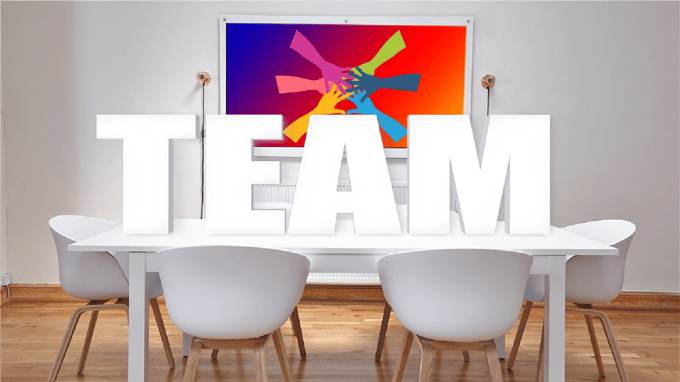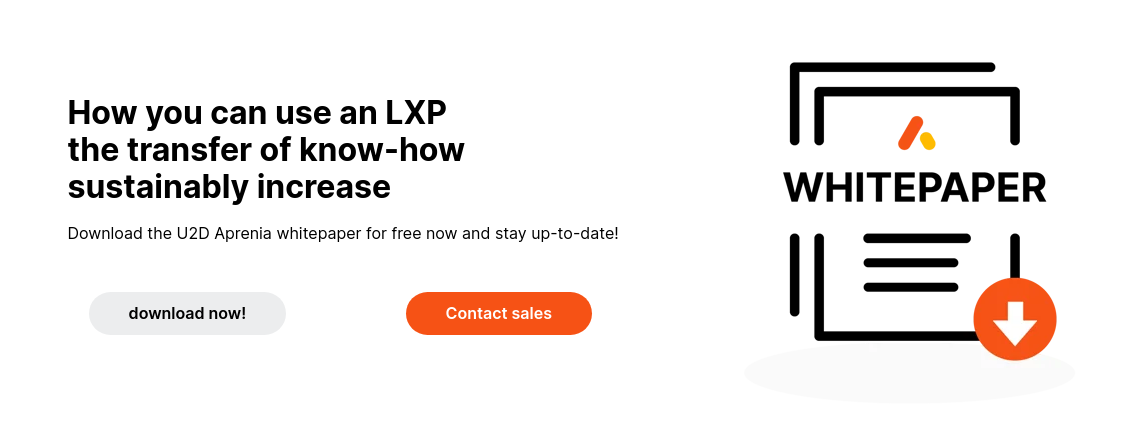Many years of know-how go into retirement
By
Bjorn Beck
·
2 minute read
Due to the retirement of older employees in the company, internal knowledge in the form of many years of professional experience is often said goodbye. Find out how the LXP U2D Aprenia ensures the survival of such knowledge here!

Generation Knowledge feat. digitalization
Knowledge has been passed on from generation to generation for centuries.
In times of digitization, however, knowledge can be accessed on the Internet within seconds.
This fact has advantages and disadvantages in different areas. Above all, however, personal contact with colleagues within a company suffers.
If an older person in the company takes big steps towards retirement, the departure date is known in advance, especially by the management board, but it usually comes as a surprise to the existing employees.
The lack of exchange between colleagues promotes the associated loss of knowledge through many years of professional experience.
The competencies that arise from such a loss are immense.
In times of digitization, however, knowledge can be accessed on the Internet within seconds.
This fact has advantages and disadvantages in different areas. Above all, however, personal contact with colleagues within a company suffers.
If an older person in the company takes big steps towards retirement, the departure date is known in advance, especially by the management board, but it usually comes as a surprise to the existing employees.
The lack of exchange between colleagues promotes the associated loss of knowledge through many years of professional experience.
The competencies that arise from such a loss are immense.
Consequences of loss of knowledge of top performers in the company
Existing knowledge enables companies to meet constantly changing requirements and thus remain competitive and future-proof.
Companies must be able to absorb information, process it securely and process it in such a way that it can be combined with existing knowledge to form the basis for targeted implementation in strategies, processes, the discovery of potential and the development of innovations.
This ability is known in science as "knowledge absorption ability."
Parallel to the knowledge economy in the company, there is also demographic change.
The high-performing baby boomer generation is retiring and with them the knowledge they have accumulated over several decades.
Many studies show the importance of employees over 50 and the Silver Society.
The employees of this age group represent a valuable resource in the company.
The communication and analytical skills are usually much more pronounced, they assess their limits better, are more quality-conscious and more loyal to their company.
The decisions this particular group makes are also based on decades of development, knowledge and work experience, and are part of the company's history and success.
Companies must be able to absorb information, process it securely and process it in such a way that it can be combined with existing knowledge to form the basis for targeted implementation in strategies, processes, the discovery of potential and the development of innovations.
This ability is known in science as "knowledge absorption ability."
Parallel to the knowledge economy in the company, there is also demographic change.
The high-performing baby boomer generation is retiring and with them the knowledge they have accumulated over several decades.
Many studies show the importance of employees over 50 and the Silver Society.
The employees of this age group represent a valuable resource in the company.
The communication and analytical skills are usually much more pronounced, they assess their limits better, are more quality-conscious and more loyal to their company.
The decisions this particular group makes are also based on decades of development, knowledge and work experience, and are part of the company's history and success.

This exploitation as well as the collection and preservation of knowledge should be part of the knowledge economy in the company.
Through a learning culture, the company can store existing knowledge and make it accessible to employees.
The ability to use large amounts of data in a targeted manner and at a central digital location has increased enormously in recent years and is part of the company's success.
Through a learning culture, the company can store existing knowledge and make it accessible to employees.
The ability to use large amounts of data in a targeted manner and at a central digital location has increased enormously in recent years and is part of the company's success.
U2D Aprenia prevents the loss of knowledge in the company
With well thought-out knowledge management in the company, entrepreneurs can gain a decisive advantage over the competition and react quickly, for example if someone from the team drops out and tasks have to be redistributed.
It's better with U2D Aprenia! The Learning Experience Platform (LXP) makes the distributed knowledge of employees accessible to everyone and thus supports effective learning success.
The LXP U2D Aprenia, the intuitive knowledge management system, supports the greatest motivator with the help of modern gamification: the natural human play instinct.
In contrast to a classic learning management system (LMS), the focus is not on hierarchically structured learning (top-down approach), but on the learner!
The most important business goal is to improve the learning experience.
In order to achieve this strategic goal, the different skills and experiences of learners must be taken into account.
Because people have different ways of learning and different levels of knowledge.
As a result, there are also considerable differences in knowledge within the company, which means that enormous potential is lost.
With U2D Aprenia we support the transfer of know-how in companies with open learning cultures and offer every type of learning the right format for it.
With the modern LXP, each user can independently share knowledge with colleagues in the form of sparks.
Employees can also earn recognition by publishing and sharing their knowledge with their managers and other colleagues.
This in turn promotes the motivation of the employees and ideally leads to a lower turnover of employees.
Get more detailed information and test U2D Aprenia now without obligation!
It's better with U2D Aprenia! The Learning Experience Platform (LXP) makes the distributed knowledge of employees accessible to everyone and thus supports effective learning success.
The LXP U2D Aprenia, the intuitive knowledge management system, supports the greatest motivator with the help of modern gamification: the natural human play instinct.
In contrast to a classic learning management system (LMS), the focus is not on hierarchically structured learning (top-down approach), but on the learner!
The most important business goal is to improve the learning experience.
In order to achieve this strategic goal, the different skills and experiences of learners must be taken into account.
Because people have different ways of learning and different levels of knowledge.
As a result, there are also considerable differences in knowledge within the company, which means that enormous potential is lost.
With U2D Aprenia we support the transfer of know-how in companies with open learning cultures and offer every type of learning the right format for it.
With the modern LXP, each user can independently share knowledge with colleagues in the form of sparks.
Employees can also earn recognition by publishing and sharing their knowledge with their managers and other colleagues.
This in turn promotes the motivation of the employees and ideally leads to a lower turnover of employees.
Get more detailed information and test U2D Aprenia now without obligation!
